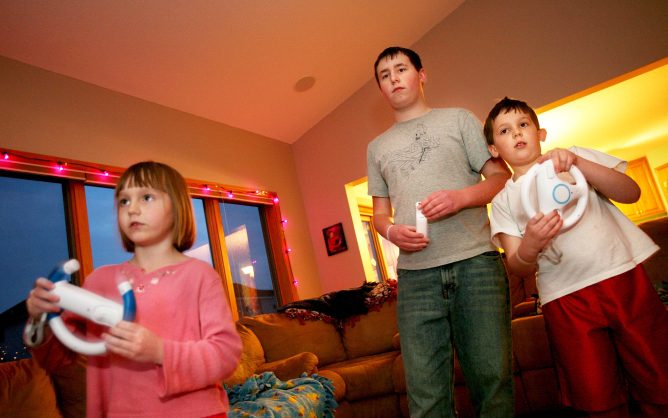Study Bolsters Evidence That Autism Runs In Families

Luke Schneider, center, plays video games with his siblings, Lucy and Jacob, who both have autism in 2009. (Jeffrey Thompson/Star Tribune/TNS)
Siblings of children with autism are about seven times more likely than others to have the developmental disability too, new research suggests.
In a study looking at more than 1,600 children who had older siblings with autism, researchers found that 20.2% also qualified for a diagnosis by the time they were age 3.
The risk was even higher — rising to almost 37% — in children with multiple siblings on the spectrum. The odds also varied based on the sex of the first child with autism in a family.
Advertisement - Continue Reading Below
“If a family’s first autistic child was a girl, they were 50% more likely to have another child with autism than if their first autistic child was a boy,” said Sally Ozonoff of the UC Davis MIND Institute who led the study. “This points to genetic differences that increase recurrence likelihood in families who have an autistic daughter.”
There were also differences in recurrence rates based on race and the mother’s level of education, with higher odds seen in non-white families and in moms with less schooling.
The findings, which were published recently in the journal Pediatrics, are based on data collected from children in the U.S., Canada and the United Kingdom who were evaluated by autism experts multiple times between 6 months and 3 years of age.
The study is a follow-up to one released in 2011, which found that the recurrence rate in families that already had a child with autism was 18.7%. The latest study comes as autism rates have continued to climb in the last decade and it also included a much larger and more diverse group of families than the initial effort.
“So, now we have two large, independent studies that report familial recurrence in the same range,” Ozonoff said. “This reinforces how important it is that providers closely monitor the siblings of autistic children for delays in social development or communication. This is especially true in families who have reduced access to care, because early diagnosis and intervention are critical.”
Read more stories like this one. Sign up for Disability Scoop's free email newsletter to get the latest developmental disability news sent straight to your inbox.


